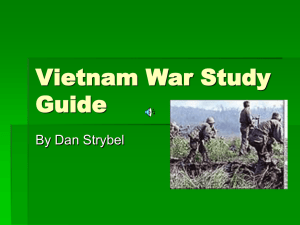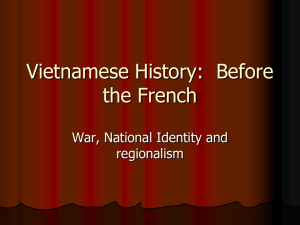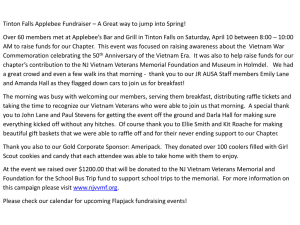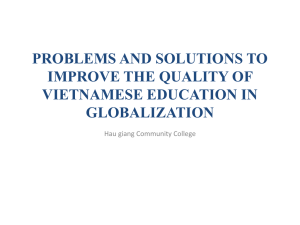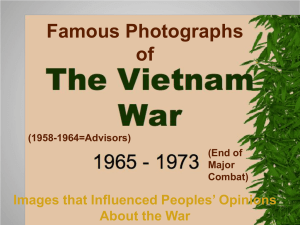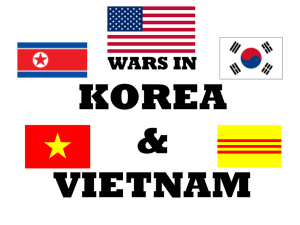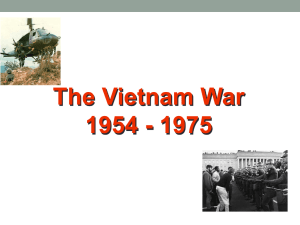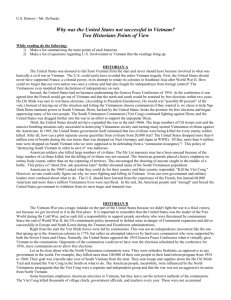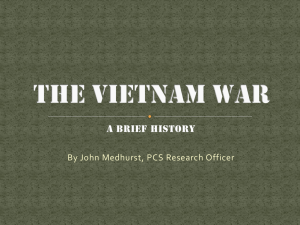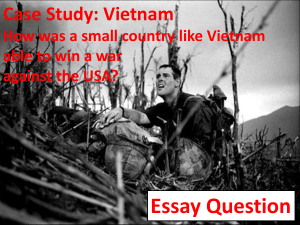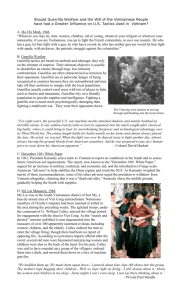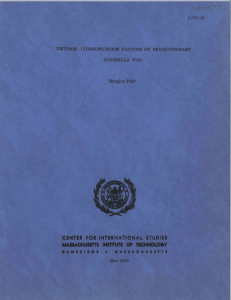Vietnam up to 1964
advertisement
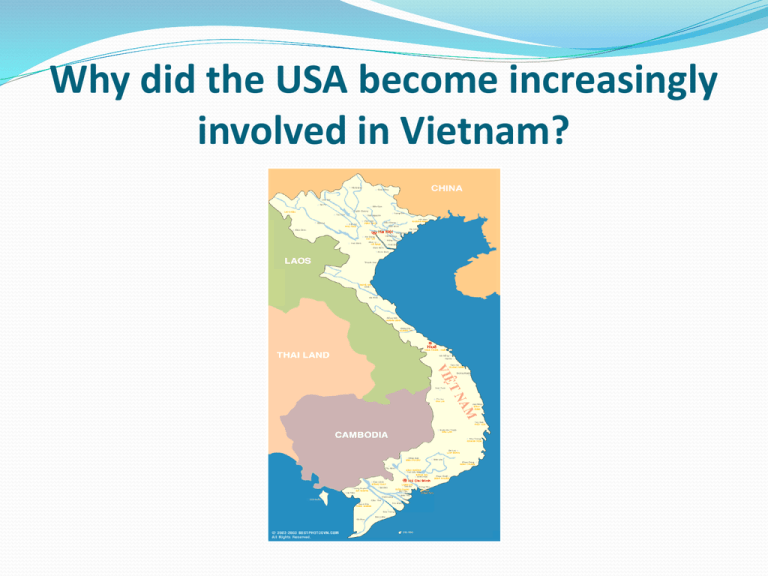
Why did the USA become increasingly involved in Vietnam? Learning objective – to understand the reasons why the USA increased its commitment in Vietnam between 1948 and 1964. I can describe the different reasons why the USA increased its commitment in Vietnam Grade D I can explain the different reasons why the USA increased its commitment in Vietnam. Grade B/C I can explain the links between and the importance of the different reasons why the USA increased its commitment in Vietnam. Grade A*/A What was Indo China? Indo-China was an area in South-East Asia which covered modern Vietnam, Laos and Cambodia and had been under French control since 1893. Indo-China was taken by the Japanese in 1941. The Indo-China War with France broke out in November 1946 when the French launched a major attack on Haiphong and, later, Hanoi. There was little fighting up to 1950. Why did the French lose the Indo China War in 1954? The French, supported by USA loans, fought Communists who wanted independence in Indo China. These Communists were called the Viet Minh [who were originally anti-Japanese fighters] and were led by Ho Chi Minh. They were supported by money and supplies from China. After fighting a long guerrilla campaign, they defeated the French at Dien Bien Phu in 1954. What was agreed at the Geneva Conference in 1954? The Americans called a conference in Geneva to draw up how Indo China was going to governed. The following points were agreed – • Vietnam would be divided temporarily along the 17th parallel – the North controlled by Ho Chi Minh and the South by Ngo Dinh Diem. • The Vietnminh forces to withdraw from the South and the French from the North. • A date for free election was fixed for July 1956. How did America get involved in South Vietnam during the late 1950s? Fearing the Communists would win the election in Vietnam in 1956, America prevented the elections and supported the South Vietnamese regime of Ngo Dinh Diem. Diem was a corrupt leader who suppressed the Buddhist majority and was bitterly anti- Communist. He persecuted peasants and Buddhists and was hugely unpopular. The American knew this but gave $1.6 billion worth of aid to support his government until he was overthrown in 1963. What was the impact of Diem’s regime on the South Vietnamese? Peasants and Buddhists felt increasingly oppressed and in December 1960 former members of the Vietminh in South Vietnam formed the National Liberation Front [NLF] to oppose Diem’s regime. The NLF was made up of all forms of opposition to the South Vietnamese government as well as Communists from North Vietnam. The NLF were called Viet Cong by the USA, a term of abuse that categorised all opponents as Vietnamese communists. How did the NLF protest against Diem’s regime in South Vietnam? Supported by North Vietnam’s Viet Minh, the NLF launched a terror campaign against South Vietnamese officials - killing 4,000 between 1959 and 1964. Buddhist monks launched a campaign of peaceful protest, which included self-immolation in public places. This was caused by increasing suppression which included the prohibition to celebrate traditional Buddhist holidays. The Viet Cong launched a guerrilla campaign against the South Vietnamese government which later extended to US bases and troops. How did the Americans get increasingly involved in Vietnam during the early 1960s? Between 1961 and 1963, Kennedy sent 16,000 military advisors to train the South Vietnamese Army – known as ARVN. Kennedy increased aid and money $270 million in 1962 alone. Land campaign began with the Strategic Hamlet policy in 1962. President Johnson was more willing to take more direct action in Vietnam than President Kennedy. Why was the Gulf of Tonkin incident a turning point? On 2nd and 3rd August, two US ships reported that they were under torpedo attack in the Gulf of Tonkin but could not see or locate the enemy. With an imminent election at the end of the year, Johnson wanted to prove his critics wrong who said he was soft on communists. Johnson ordered US jets to attack North Vietnamese torpedo bases and destroyed 25 bases. Johnson used this incident to push through ‘The Gulf of Tonkin’ resolution on 7th August 1964. This gave the President the power to take any military measures he thought necessary to defend ‘freedom’ in South East Asia. The next day, the first US combat troops landed in Vietnam. Tasks Draw a timeline of the period 1945 to 1964. Using a copy of these slides, mark on it the increasing US involvement in South East Asia using the following headings – No direct US involvement. Financial support. Political involvement. Military involvement. Choose two events that you think were critical in increasing the USA’s involvement in the war in Vietnam? Explain your decisions. Stick a copy of the why did the USA become involved in Vietnam cartoon into your book. Annotate around each section an explanation of each area. Plenary – a touch of Scrabble What are the three key words from this lesson that sums up your learning? Which word has the highest value if you used in a game of Scrabble? Compare with the person next to you. Which word has the highest value?
![vietnam[1].](http://s2.studylib.net/store/data/005329784_1-42b2e9fc4f7c73463c31fd4de82c4fa3-300x300.png)
